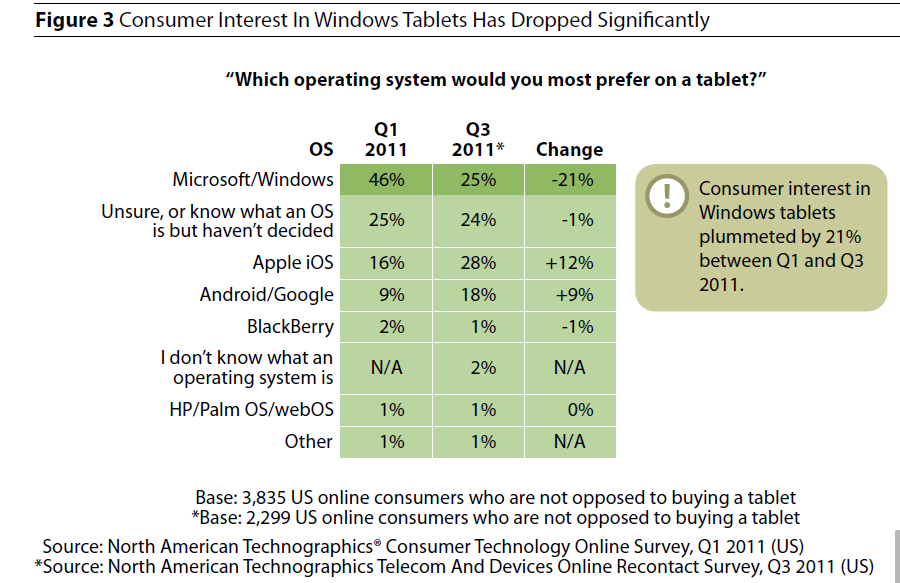Consumers' interest in Windows tablets plummets, study claims

Just a couple months after one study claimed the majority of tabet-buying users wanted a device based on Windows, another research outfit is reporting that consumers are sick of waiting for a true iPad competitor from Microsoft.
Consumers' interest in buying a Windows tablet has plummeted in the past six months, according to a new Forrester Research report on November 29.
"Microsoft has missed the peak of consumer desire for a product they haven't yet released," said Forrester in a new blog post.
In Q1 of this year, when Forrester asked consumers considering buying a tablet which operating system they would prefer on the device, 46 percent said Microsoft/Windows. Now that number has now dropped to 25% -- a decline Forrester said should be "alarming to Microsoft."
(click on table above to enlarge)
(Forrester's latest data comes from recontacting in September 2011 roughly 2,300 U.S. online consumers who are "not opposed"to buying a tablet" as part of its "North American Technographics Telecom And Devices Online Survey.")
"For tablets, though, Windows really isn’t a fast follower. Rather it’s (at best) a fifth-mover after iPad, Android tablets like the Samsung Galaxy Tab, HP’s now-defunct webOS tablet, and the BlackBerry PlayBook tablet," said Forrester analysts JP Gownder and Sarah Rotman Epps.
"While Windows’ product strategists can learn from these products, other players have come a long way in executing and refining their products — Apple, Samsung, and others have already launched second-generation products and will likely be into their third generation by the time Windows 8 launches," Gownder and Rotman Epps added.
Microsoft is taking too long to bring a true iPad competitor to market, the analysts said. (Windows 8 tablets are expected to come to market starting in the fall of 2012 by many Microsoft watchers.)
But the slow development and delivery schedule isn't Microsoft's only problem, Forrester opined. The analysts also cited the iPad's move into office productivity, consumer interest in Android tablets and the level of OEM support for Windows tablets as other factors which may be affecting consumer interest.
The Forrester analysts advised Microsoft to differentiate itself from iPads and Android tablets by focusing more on office productivity and gaming.
Forrester has been -- and continues to be -- fairly bullish about Microsoft's Windows 8 strategy. But I have to agree with their latest take to at least some degree.
I think Microsoft overestimated how much uptake there would be with Windows 7-based tablets. The Redmondians seemed to believe that business users would prefer the ability to run legacy apps (especially Microsoft Office) would save their bacon and tried to get their sales force to emphasize the enterprise shortcomings (like lack of security) of the iPad when selling against it. Windows 7 wasn't a touch-centric operating system and Windows tablets to date have been pricey, heavy and lacking good battery life.
Will users be willing to wait until later next year for Windows 8 tablets? Or should (and could) and Microsoft and its PC partners start playing up some of the new tablet form factors coming to market in the coming months as "Windows 8 ready" to grab users who aren't willing to wait for holiday 2012 for a Windows tablet?
